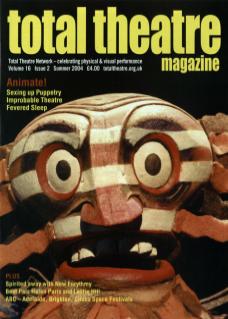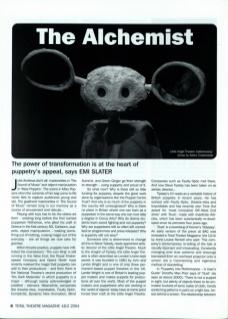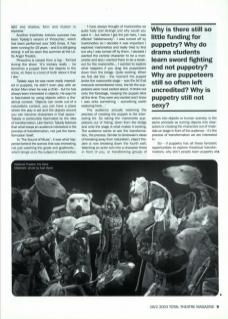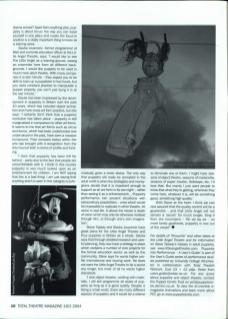Julie Andrews did it all: marionettes in The Sound of Music and object manipulation in Mary Poppins. The scene in Mary Poppins when the contents of her bag come to life never fails to capture audiences young and old. The goatherd marionettes in The Sound of Music remain long in our memory as a source of amusement and ridicule...
Playing with toys has to be the oldest artform – existing long before the first named puppeteer Potheinos, who plied his craft in Greece in the first century AD. Cartoons, puppets, object manipulation – making something out of nothing, making magic out of the everyday – are all things we now take for granted.
Within theatre practice, puppets have infiltrated the mainstream: The Lion King is still running in the West End; the Royal Shakespeare Company and Opera North have recently realised the magic that puppetry can add to their productions – and then there is the National Theatre's recent production of His Dark Materials in which puppetry is a major – although barely acknowledged or credited – element. Meanwhile, companies like Theatre-rites, Improbable, Faulty Optic, Complicité, Dynamic New Animation, Blind Summit, and Green Ginger go from strength to strength – using puppetry and proud of it.
So what now? Why is there still so little funding for puppetry, despite the good work done by organisations like the Puppet Centre Trust? And why is so much of the puppetry in this country left unrecognised? Why is there no place in Britain where one can train as a puppeteer in the same way one can now take a degree in Circus Arts? Why do drama students learn sword fighting and not puppetry? Why are puppeteers still so often left uncredited on programmes and press releases? Why is puppetry still not sexy?
Someone who is determined to change all this is Steve Tiplady, newly appointed artistic director of the Little Angel Theatre. Much to the chagrin of Tiplady, the Little Angel Theatre is often described as London's best-kept secret. It was founded in 1961 by John and Lyndie Wright and is one of only three permanent-based puppet theatres in the UK. Lyndie Wright is one of Britain's leading puppet-makers and makes puppets for productions all over the world. Most of the puppet-makers and puppeteers who are working in the ‘world of objects' today have at some point honed their craft at the Little Angel Theatre.
Companies such as Faulty Optic met there. And now Steve Tiplady has been taken on as artistic director...
Tiplady's CV reads as a veritable history of British puppetry in recent years. He has worked with Faulty Optic, theatre-rites and Improbable and has recently won the Time Out award for 'most innovative Off-West End show’ with Dust, made with Indefinite Articles, which has been substantially re-developed since its premiere four years ago.
Dust is a reworking of Homer's Odyssey. An early version of the piece at BAC was reviewed in Total Theatre Magazine (Vol 12/4) by Anne Louise Rentell who said: ‘The company's contemporary re-telling of the tale is visually resonant and intoxicating. Constantly changing vivid dust patterns and drawings translated from an overhead projector onto a screen are a mesmerising and ingenious method of storytelling.'
In 'Puppetry into Performance – A User's Guide' Dorothy Max Prior says of Dust (as seen at visions 2000): 'There is not a puppet in sight, but plenty of objects there to be animated: buckets of sand, bales of cloth, hands scratching patterns in paint on a light box, torsos behind a screen. The relationship between light and shadow, form and illusion is explored.’
Another Indefinite Articles success has been Tiplady's version of Pinocchio, which has been performed over 500 times. It has been running for ten years – and it is still going strong: it will be seen this summer at the Little Angel Theatre.
Pinocchio is carved from a log – formed during the show: 'It's trickery really – he becomes a puppet from the objects in the show, so there is a kind of truth about it that I like.’
Tiplady says he was never really interested in puppets, he didn't even play with an Action Man when he was a child – but he has always been interested in objects. He says he is fascinated by using objects within a theatrical context: 'Objects can come out of a naturalistic context, you can have a place where the play is set and the objects around you can become characters in that space.’ Tiplady is particularly fascinated by the idea of transformation. Like Kantor, Tiplady believes that what keeps an audience interested is the process of transformation, not just the transformation itself.
In The Sound of Music, it was what happened behind the scenes that was interesting, not just watching the goats and goatherds... which brings us to the subject of marionettes:
'I have always thought of marionettes as quite fusty and strange and why would you want it – but before I got the job here, I was offered Jabberwocky. I was turned off by marionettes so I decided it was important I explored marionettes and really tried to find out why I was turned off by them. I decided I wanted the central character to be a marionette and also I wanted there to be a breakout for the marionette... I wanted to explore what happens if you drag the puppeteers down from the bridge. Quite exciting. When we first did this – the moment the puppet broke the marionette stage – it was the bit that everyone remembered most, the bit the puppeteers were most excited about. It broke out onto the forestage, keeping the puppet alive all the time. They were very excited and I knew I was onto something – something worth exploring here...’
The audience actually watching the process of creating the puppet is the interesting bit. So taking the marionette puppeteers out of hiding, down from the bridge and onto the stage is what makes it exciting. The audience wants to see the transformation, the process. Similar to Grotowski's ideas of breaking away from naturalism, object theatre is now breaking down the fourth wall. Watching an actor turn into a character there in front of you, or transforming groups of actors into objects or human scenery, is the same principle as turning objects into characters or creating the characters out of materials on stage in front of the audience – it's the process of transformation we are interested in.
So – if puppetry has all these fantastic opportunities to explore theatrical transformations, why don't people learn puppetry at drama school? Apart from anything else, puppetry is about focus; the way you can leave yourself in one place and create the focus in another is a vitally important thing to know as a training actor.
Slavka Jovanovic, former programmer at BAC and currently education officer at the Little Angel Theatre, says: 'I would like to see The Little Angel as a training ground, basing an ensemble here from all different backgrounds. I would like puppets to be used in much more adult theatre. With many companies it is last minute – they expect you to be able to train up a puppeteer in two hours, but you need constant practice to manipulate a puppet properly, you can't just bung it in at the last minute.'
Slavka has been impressed by the development in puppetry in Britain over the past ten years, which has included object animation and more cross-artform practice, but she says: 'I certainly don't think that a puppetry revolution has taken place – puppetry is still marginalised in comparison to other artforms. It seems to me that artforms such as circus and dance, which had been underfunded and undervalued in the past, have seen a massive turnaround. Their renewed status within the arts has brought with it recognition from the Arts Council both in terms of profile and funding
'I think that puppetry has been left far behind – partly due to the fact that people are uncomfortable with it, I think in this country puppetry is very much looked upon as an entertainment for children. I am NOT saying that this is a bad thing. I am just saying that anything which is seen in this category is automatically given a lower status. The only way that puppetry will really be accepted in the adult world is when the strategists and money-givers decide that it is important enough to support as an artform in its own right – rather than seeing it as an enhancement... Puppetry performance can present situations with extraordinary possibilities – ones which would be impossible to replicate in other theatre, let alone in real life. It allows the viewer a depth of vision which may only be otherwise realised through film, or through one's own imagination.'
Steve Tiplady and Slavka Jovanovic have great plans for the Little Angel Theatre and thus puppetry in Britain as a whole. Slavka says that through detailed research and careful planning, they now have a strategy in place which contains a number of core projects for the formal education sector as well as the community. Steve says he wants higher profile international and touring work. He does not want the Little Angel Theatre to be a secret any longer, but most of all he wants higher standards:
'I love object theatre, working with materials. I will still programme all styles of puppetry as long as it is good quality. Despite it being a small world, there are many different aspects of puppetry and it would be a shame to eliminate any of them. I might have seasons of object theatre, seasons of marionette, seasons of paper theatre, Sellotape, etc. I'd love that. But mainly I just want people to know that what they're getting, whenever they come here, whatever it is, will be something good, something high quality.’
With Steve at the helm I think we can rest assured that the quality control will be a guarantee – and that Little Angel will not remain a 'secret' for much longer. Sing it from the mountains – 'Oh da lay ee – no more lonely goatherds, puppetry is now out of the closet!’
For details of Pinocchio and other dates at the Little Angel Theatre and for information on Steve Tiplady's classes in adult puppetry, see www.littleangeltheatre.com. Puppetry into Performance - A User's Guide is part of the User's Guide series of performance studies published by University College Winchester in collaboration with Total Theatre Network. Cost £5 + £2 p&p. Order from users.guide@wkac.ac.uk. For any query about puppetry and object theatre, contact the Puppet Centre Trust on pct@puppetcentre.demon.co.uk To view the bi-monthly emagazine Animations and learn more about PCT, go to www.puppetcentre.com



